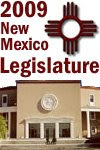Some high-profile ethics reform bills gained momentum today in the Senate Rules Committee.
Members of the committee who were present unanimously gave a do-pass recommendation to Senate Bill 128, sponsored by Peter Wirth, D-Santa Fe. The bill would require that candidates file reports of expenditures and contributions twice a year in off-election years. Currently, the law requires that annually.
And they discussed at length proposals to prohibit lawmakers from becoming lobbyists for one year after they leave office and to ban campaign contributions from state contractors and prospective contractors, or at least require the disclosure of such contributions.
The committee’s next step on those proposals is to consider various bills before them and draft committee substitute bills that combine them. Chair Linda Lopez, D-Albuquerque, said she hopes to consider substitute bills for both proposals on Friday.
In the case of the proposal to ban former legislators from becoming lobbyists for a time, the primary difference between Senate Bill 94, sponsored by Mark Boitano, R-Albuquerque, and Senate Bill 163, sponsored by Eric Griego, D-Albuquerque, is the date the proposal would take effect. Griego’s has it taking effect at the end of 2010, while Boitano’s has it taking effect on July 1 of this year.
Combining various bills related to the other proposal — to ban or require the disclosure of contractors’ contributions — is a more complicated task. Senate Bill 258, sponsored by Tim Keller, D-Albuquerque, would ban all campaign contributions to statewide elected officials from state contractors or prospective contractors. Senate Bill 263, sponsored by Sue Wilson Beffort, R-Sandia Park, and Senate Bill 296, sponsored by Dede Feldman, D-Albuquerque, would both require that prospective and current state and local government contractors disclose their campaign contributions and that such disclosures be included in an Internet database accessible to the public.
But the bills from Beffort and Feldman have some substantial differences as well. Beffort’s vastly expands the state definition of state contractor, while Feldman’s expands the definition of public official. One requires the secretary of state to maintain the online database, while the other requires that the Department of Finance do it.
Regardless, most members of the committee who were present for today’s meeting expressed general support for both proposals.
‘We get shaken down all the time’
In arguing for his bill today, Keller said others have rightly pointed out that campaign contribution limits and other attempts to slow money into the political system can be circumvented, while his proposal would completely “dissolve the connection between state contractors and contributions.”
During the hearing on Keller’s bill, former Sen. Diane Snyder, who heads an engineering association, said she takes “great offense at the fact that all of these bills are put in the tone of the bad guy being the person or firm who has the state contract.”
“We get shaken down all the time, all the time. My members, I can tell you horror story after horror story after horror story,” Synder told the committee. “… All we ask is that we know what the real rules are so that you put them down on paper and we can comply. We don’t want to be breaking the law.”
The committee has not yet considered some of the most high-profile ethics reform proposals this year: enacting campaign contribution limits, creating an independent state ethics commission and opening legislative conference committees to the public. The first has been scheduled but not heard; the others haven’t been scheduled.
And, last week, the committee’s members decided to leave in limbo a proposal to expand the state’s public financing system to include races for legislative and statewide elected seats.
